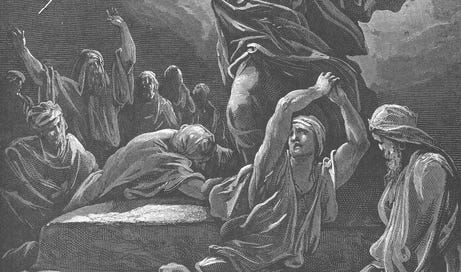Philosophizing with the Hämmer: reciprocality and solorpg as fractal ecosystem
More theory crafting on solo rpgs.
“Triangles outside triangles outside triangles ad infinitum the Koch curve goes, it's infinitely infinitesimal, this self-similarity shows. A length too great to measure, an area too small to see, what else can this contradiction be, behold fractal geometry." -The Fractal Explorer
This poem by Bernt Wahl beautifully summarizes this week's subject of Philosophizing with the Hammer: the folding of ideas and the emergent properties that arise from this. At the moment I’m exploring solo play and writing based on solo play through the lens of ecosystems and fractals. April is philosofphy month in the Netherlands, so the rest of this month I will post theory crafting pieces, in stead of a new Teigill story.
In Dutch, my native language, the word ecosystem can mean both a biological community of interacting organisms and their physical environment as, in a more general sense, a complex network or interconnected system. In this article, I explore solo play with both meanings in mind.
In my opinion, the gameplay of a solo RPG consists of two parts:
the rules of the game and the game master emulator, in the case of the Teigill stories World of Dungeons as game and the Mythic GME deck, supplemented with Rory’s Story Cubes and UNE as game master emulator.
the evolving world I explore through the perspective of Teigill and Teigill’s place in it: the NPCs, the cities, the factions, the languages, the philosophies of life the history, etc.
For me, both parts are equally creative. This causes a descent into the specific whereby the stories and the generative rules that influence these stories enter into a reciprocal relationship with each other. When I write Teigill’s stories the world changes the rules: based on new NPCs, factions, scenes, reactions from Teigill and NPCs I adjust the spark tables, event focus, description and random tables.
On the other hand the rules change the world: because I change the rules based on the stories, those rules in turn force the world in a different direction. Things become more grim, more funny or more dreamlike, depending on the tables I use.
I love the reciprocality between these two, because it takes on a life of its own. This iterative process of using the stories to create the world and tables and use the tables and world to create the stories. Almost as if it's an ecosystem. I can influence but cannot predict the development of this rule/story hybrid. It has its own life as well as being my design.
Life can be defined as having capacity for growth, reproduction, functional activity, and continual change preceding death and the world and rule system feel like that. It is growing, there is meaningful activity (for me at least) and continuous change. And when you good folk read and write back to me on these ideas they reproduce as well. The emergent properties of the simple rules (often a small A4 of text, or a couple of dice, of a deck of cards) in combination with the interpretation step that goes with it creates endless complexity.
Let me give an example: (small spoiler) in in the opening scene of one of the next Teigill stories he finds himself in his brother's hut who is predicting his future with horse entrails. This situation unfolded in a few steps from the prompt: Teigill receives news from a loved one. I’m sorry I didn’t record the steps so I can’t recreate them here. But I find it hilarious.
All of this reminds me of a Koch snowflake: a fractal curve discovered in 1904 by the Swedish mathematician Helge von Koch that can be built iteratively in a sequence of stages. The first stage is an equilateral triangle, and each successive stage is formed by adding outward bends to each side of the previous stage, making smaller equilateral triangles. This leads to a figure that encloses a finite area, but has an infinite perimeter.
This is how the interaction between the simple rules and the world feels, with the interpretation step acting as glue. A small set of game rules, some spark tables, some random tables, an oracle and the possibilities are endless.
In my everyday life as someone in my early forties I can sometimes envy the curiosity of young people. During solo RPG games I sometimes get so curious I don’t know where to begin. Whether based on a few thirteen-line lists and a deck of cards (Alone Among the Stars) or with occult tables, a mountain of dice, several folders with notes and two screens in front of me (often the case when I'm working with Teigill), I love it all.
In this short article I continued to create new language for myself to think about this hobby in different ways. I'm curious what concepts and frameworks others use to theory craft about RPGs. If anyone knows of texts, podcasts or other content creators who are working on this, I'd love to hear about them so feel free to drop a line in chat.
If you like theory crafting posts like these you might like this one on core game loops in normal RPG and solo rpg as well






